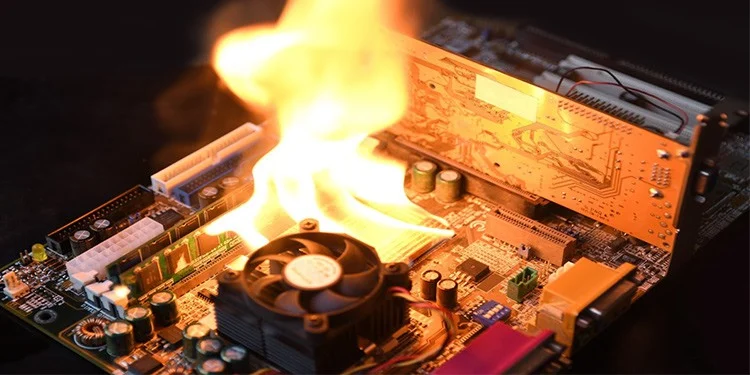The graphics processing unit (GPU) was designed to withstand high temperatures and it usually runs at high temperatures, especially when running graphics-based programs. Dedicated GPUs have fans that cool them down when they get hot. But if your GPU is running hotter than the manufacturer recommends and your programs start to run slowly, it’s probably overheating.
Despite the built-in protection feature in most GPUs, it is not recommended to overwork your GPU to the point where it shuts down frequently to prevent overheating. This article discusses the symptoms, causes of GPU overheating, and how to resolve the overheating problem and prevent it from happening in the future.
What causes the GPU to overheat?
Following are four common causes of GPU overheating.
Dust in the air vent
Computer fans draw cool air from the surroundings into the system through the intake vents to cool the hot components and then release the hot air outside the computer through the outlet vents. This is usually a straightforward process that requires the vents to be clear of obstructions blocking the airflow.
When dust builds up in the air vents, it blocks the flow of cool air and doesn’t allow the system to remove hot air, causing the system to overheat.
Cooling system malfunction
Most PCs are equipped with cooling fans and thermal paste to cool the system whenever the system heats up. Some graphics cards have special fans because they run hotter than other components. When the computer runs heavy programs and its internal temperature rises, the cooling system cools it down.
If the thermal paste wears off or one of the fans breaks, the cooling process will be compromised, and as the system runs heavy programs and heats up, the cooling system won’t be able to cool it down.
Overloading your GPU
Your GPU ratings are usually provided by the manufacturer so you know what types of programs it can easily run and those that push its power threshold. Whenever you want to run a program or play a game on your computer, check to see if its requirements don’t exceed your GPU.
When your GPU runs regular games, the computer runs smoothly, and the system doesn’t heat up. However, when you run graphically intensive games, you start pushing the limits of your GPU, and a lot of heat is generated. If you overload your GPU with games that demand more than they can handle, your GPU will overheat and shut down.
Bad GPU
Sometimes, your GPU overheats when malfunctioning. You’ll notice this when you run standard games that aren’t as demanding, yet your GPU starts to heat up, and your fans make noise at high speeds, overheating GPUs. Try to cool down.
What happens when your GPU overheats?
Overheating is a simple process. This usually happens when your GPU generates more heat than the cooling system can cool. This could be because the GPU is handling more programs than it can handle, causing it to generate more heat than the cooling system. or the cooling system is underperforming. Either way, it’s not a good sign.
The GPU is designed with a built-in safety feature that slows it down when it overheats and shuts it down before it overheats. When the GPU overheats, the fans start running at maximum speed, making loud noises. The protection feature slows down the speed of the graphics card, reducing the performance of the GPU as it loads frames more slowly.
This affects the program you’re running, and you can see symptoms as your program starts showing graphics-related errors like frequent screen glitches, artifacts, etc. Completely overheated.
Your GPU is heat resistant and can withstand high temperatures. A few cases above will not hurt him. However, suppose you ignore the warning signs and let it stay hot for too long, or you let the overheating situation happen too often. In this case, you risk permanently damaging your GPU.
How to Fix and Prevent GPU Overheating
Overheating shortens the lifespan of your GPU and can damage it, along with other components, in a short amount of time. To prolong the life of your GPU, you should fix overheating problems and prevent future occurrences. You can do it in the following ways.
Do not overload the GPU
Check the manufacturer’s rating to know your GPU’s capability and only run games it can handle. Don’t constantly overclock your GPU.
Clean the vents
Your vents draw in air from the surroundings, and the air filter removes impurities before allowing the air to enter the computer. Dust can collect in the inlet of the vents and in the filter. Make sure you clean the vents regularly to allow regular air to pass through.
Replace damaged fan and thermal paste
Routinely check to see if the cooling fans are damaged or worn out thermal paste, and replace them if they are.
Use a cooling pad
If the internal fans are not enough to cool your computer, you can buy a cooling pad to cool your computer when it gets hot. It is suitable for laptops.
Check your GPU temperature
Use a specific software application to check the temperature of your GPU to see if you need to cool it down. Although GPUs can run at high temperatures, make sure your GPU temperature does not exceed the manufacturer’s recommendation.
Final Thought
No matter how effective your built-in safety features are or how heat resistant your GPU is, don’t subject it to conditions that could cause it to overheat and effectively kill it and a few more. May damage other components.
